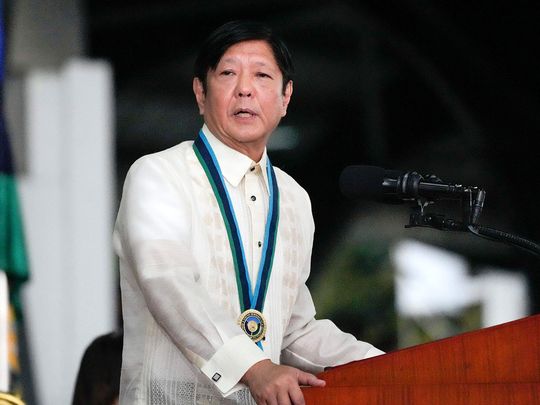
The Philippines noticed early signs of rift within the ruling Marcos family over the pro-West policy adopted by President Ferdinand Marcos Jr. The president’s sister Senator Imee Marcos claimed his China policy was leading the country down a “dangerous path.”
She was reacting to a new executive order by her brother, setting up a National Maritime Council (NMC) with the mandate to “strengthen the Philippines’ maritime security and maritime domain awareness.”
Senator Imee Marcos, who chairs the Philippines Senate Committee on Foreign Relations said, “Let’s not be hasty, let’s not be hot-headed so that we can take care of the welfare of our people.”
In addition to the president’s sister, his own Vice-President Sara Duterte, daughter of former President Rodrigo Duterte has reaffirmed China friendly stance of her father.
Notwithstanding Duterte’s own position on the China, he faced serious headwinds both from his military and bureaucracy both of which seem clearly pegged to the American interests in the East Asian region.
In spite of threats not to renew the agreement on hosting US bases in the Philippines, he succumbed in 2021 to renew them — most likely he found it impossible to overcome the resistance from these entrenched groups. And then in March 2023 Marcos provided another 4 new sites under the 2014 Enhanced Defense Cooperation Agreement for use by the Americans.
January 2023 Marcos Jr returned from his first (state) visit to China with promises of $22 billions of Chinese investments in various sectors of Philippines economy. Following his first official visit to the US in April/May the same year his public tack over the Philippines relations with the US, his approach towards contested claim in the South China Sea and China changed.
US-Philippines relationship
Antonio J Montalvan II, a public writer and a university professor says that, “the Marcos government is serious about reversing Duterte’s policy of deference towards China, in part as an effort to improve his family’s image on the world stage” adding that by being pro-America Marcos not only removes Duterte’s pro-China stigma but also becomes a darling of the western world.
Marcos Jr. recently concluded a four-day visit to Washington. During his stay, the Philippine leader held meetings with President Joe Biden at the White House, joined Vice President Kamala Harris for brunch, engaged with members of Congress, and made history as the first foreign leader hosted with full honours at the Pentagon, where he met with Secretary of Defence Lloyd Austin. Marcos also participated in events with US businesses, engaged with the local Filipino American community, and addressed a public forum also.
The visit was hailed in the Western press as further propelling the ongoing modernisation of the US-Philippines defence relationship, building upon strides made since the issuance of a joint vision statement for the alliance during their November 2021 Bilateral Strategic Dialogue.
Be as it is, President Marcos may be feted in the US, but nearer home, he may find it hard to do a balancing act among ASEAN states over taking sides between China and the US.
Sajjad Ashraf served as an adjunct professor at the Lee Kuan Yew School of Public Policy, National University of Singapore from 2009 to 2017. He was a member of the Pakistan Foreign Service from 1973 to 2008 and served as an ambassador to several countries.






_resources1_16a45059ca3_small.jpg)

